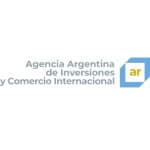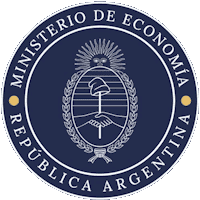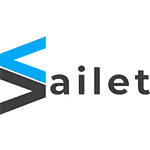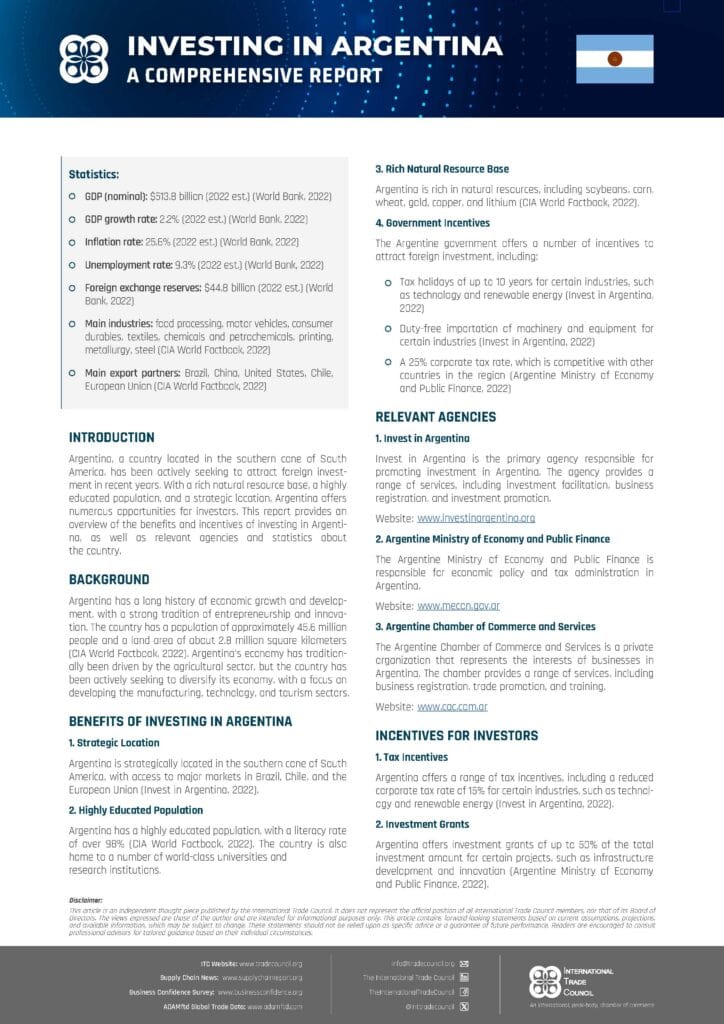- Type of Government: Federal presidential constitutional republic
- Population: Approximately 45 million
- GDP: Around $640 billion USD
- Corporate Tax Rate: 25% to 35%
- Personal Income Tax Rate: 5% to 35%
- Major Exports: Soybeans, corn, vehicles, wheat, beef
- Major Imports: Machinery, motor vehicles, petroleum, plastics, organic chemicals
Doing Business with Argentina
A comprehensive guide to doing business, exporting, investing, and manufacturing in Argentina.
-
Research Market Demand
- Identify the demand for your product in Argentina.
- Analyze competition and local market conditions.
-
Understand Export Regulations
- Familiarize yourself with Argentina’s import regulations and tariffs.
- Ensure compliance with international trade laws.
-
Product Classification
- Determine the correct Harmonized System (HS) code for your product.
-
Documentation Preparation
- Prepare necessary documents: commercial invoice, packing list, certificate of origin, and bill of lading.
-
Find a Local Partner
- Identify a local distributor or agent to navigate local logistics and regulations.
-
Register with Argentine Customs
- Ensure your business is registered with Argentina’s customs authorities.
-
Comply with Standards
- Adhere to Argentina’s product standards and labeling requirements.
-
Arrange Shipping and Logistics
- Choose a reliable logistics provider familiar with Argentine imports.
- Decide on the mode of transport and manage insurance.
-
Customs Clearance
- Work with your local partner to manage customs clearance upon product arrival.
-
Payment and Financing
- Establish a secure payment method.
- Consider export insurance or financing options if needed.
Key Contacts
- Argentine Customs (AFIP)
- Website: AFIP
- Ministry of Foreign Affairs and Worship
- Website: Ministry of Foreign Affairs
- Argentina Chamber of Commerce
Here’s a general guide on how to import goods into Argentina:
-
Research Import Regulations
- Understand Argentina’s import laws and tariff classifications.
- Check for any restrictions on your products.
-
Obtain Import Licenses
- Determine if your products require specific import licenses or permits.
-
Register with Argentine Customs
- Ensure your business is registered with Argentina’s customs (AFIP).
-
Classify Your Goods
- Use the Harmonized System (HS) code to classify your goods correctly.
-
Find a Customs Broker
- Hire a licensed customs broker to assist with documentation and regulations.
-
Prepare Required Documentation
- Gather necessary documents: commercial invoice, packing list, bill of lading, certificate of origin.
-
Ensure Compliance with Standards
- Meet Argentina’s standards and labeling requirements for your products.
-
Arrange Shipping and Logistics
- Choose a reliable logistics provider and arrange for transportation and insurance.
-
Customs Clearance
- Work with your customs broker to ensure smooth customs clearance.
-
Payment of Duties and Taxes
- Calculate and pay any applicable import duties, taxes, and fees.
Key Contacts
- Argentine Customs (AFIP)
- Website: AFIP
- Ministry of Production and Labor
- Website: Ministry of Productive Development
- Argentine Chamber of Importers
Here’s a guide on how to incorporate a company in Argentina:
-
Choose a Business Structure
- Decide on the type of entity (e.g., SRL, SA).
-
Reserve a Company Name
- Check and reserve your company name with the Office of Corporations (IGJ).
-
Draft the Bylaws
- Prepare the company’s bylaws with the help of a notary.
-
Deposit Initial Capital
- Open a bank account and deposit the minimum capital required.
-
Register with the Public Registry
- Submit the bylaws and incorporation documents to the IGJ.
-
Obtain a Tax Identification Number (CUIT)
- Register with the Federal Administration of Public Revenue (AFIP).
-
Register for Social Security
- Register your company for social security and pensions.
-
Obtain Municipal Licenses
- Apply for any necessary local business licenses.
-
Register Employees
- Enroll employees in the social security system.
Costs
- Notary Fees: Varies, generally around $1,000 to $2,000 USD.
- Initial Capital Requirement: Depends on the type of company; typically around $300 USD for SRL, higher for SA.
- Registration Fees: Approximately $100 to $500 USD.
Key Contacts
- Office of Corporations (IGJ)
- Website: IGJ
- Federal Administration of Public Revenue (AFIP)
- Website: AFIP
- Ministry of Production and Labor
- Website: Ministry of Productive Development
Here’s a guide on how to set up a manufacturing plant in Argentina:
-
Conduct Feasibility Study
- Analyze the market, costs, and location benefits.
-
Choose a Legal Structure
- Decide on the type of business entity (e.g., SRL, SA).
-
Register the Company
- Follow incorporation steps: reserve name, draft bylaws, register with IGJ, and obtain CUIT.
-
Select a Location
- Choose a strategic location considering logistics, access to resources, and workforce availability.
-
Acquire Land and Permits
- Purchase or lease land and obtain necessary construction and environmental permits.
-
Design and Build the Facility
- Hire architects and contractors to design and construct the plant.
-
Install Machinery and Equipment
- Purchase and set up manufacturing equipment.
-
Hire and Train Employees
- Recruit skilled labor and provide necessary training.
-
Ensure Compliance with Regulations
- Adhere to safety, environmental, and labor regulations.
-
Register with Relevant Authorities
- Register with municipal authorities and obtain operational licenses.
Key Contacts
- Ministry of Productive Development
- Website: Ministry of Productive Development
- Federal Administration of Public Revenue (AFIP)
- Website: AFIP
- National Institute of Industrial Technology (INTI)
- Website: INTI
Here’s a guide on how to register a trademark in Argentina:
-
Conduct a Trademark Search
- Check for existing trademarks to avoid conflicts using the National Institute of Industrial Property (INPI) database.
-
Prepare Application
- Gather necessary information: trademark name, logo, class of goods/services.
-
Submit Application
- File the application with INPI online or in person.
-
Pay Fees
- Pay the required application fee, approximately $50 to $100 USD, depending on the trademark class.
-
Examination Process
- INPI examines the application for compliance and potential conflicts.
-
Publication in Official Bulletin
- If approved, your trademark is published for opposition, allowing third parties to contest.
-
Opposition Period
- Wait for a 30-day period for any oppositions. If opposed, legal proceedings may ensue.
-
Registration and Issuance
- If no opposition, or once resolved, INPI registers your trademark and issues a certificate.
-
Renewal
- Trademarks are valid for 10 years and can be renewed indefinitely.
Key Contacts
- National Institute of Industrial Property (INPI)
- Website: INPI
Here’s an overview of key factors related to doing business in Argentina:
Social Factors
- Language: Spanish is the official language. Understanding local dialects and business jargon is beneficial.
- Business Culture: Personal relationships are important. Building trust and networking are crucial for success.
Cultural Factors
- Work Ethic: Punctuality is valued, but meetings may start later than scheduled. Face-to-face meetings are preferred.
- Communication Style: Argentinians are generally warm and expressive. Non-verbal communication plays a significant role.
Political Factors
- Government Structure: Argentina is a federal presidential constitutional republic.
- Regulations: Frequent changes in regulations can impact business operations. Staying informed is essential.
Economic Factors
- Foreign Exchange: The Argentine peso can be volatile. Currency fluctuations may affect costs and pricing.
- Inflation: Historically high inflation rates can impact purchasing power and financial planning.
Legal and Regulatory Environment
- Rule of Law: Legal processes can be slow. It’s important to ensure compliance with local laws and regulations.
- Intellectual Property: Protecting intellectual property can be challenging. Register trademarks and patents with INPI.
Additional Considerations
- Infrastructure: While urban areas are well-developed, rural regions may lack infrastructure.
- Market Access: Argentina is part of Mercosur, offering access to regional markets.
Relevant URLs
- Ministry of Foreign Affairs and Worship: Ministry of Foreign Affairs
- National Institute of Industrial Property (INPI): INPI
- Federal Administration of Public Revenue (AFIP): AFIP
Ask our Experts on Doing Business in/with Argentina
If you’re looking to do business or invest in Argentina, we can provide expert guidance, market insights, and valuable connections to help you navigate the local landscape. Contact us today to discover how we can assist in making your venture a success.












